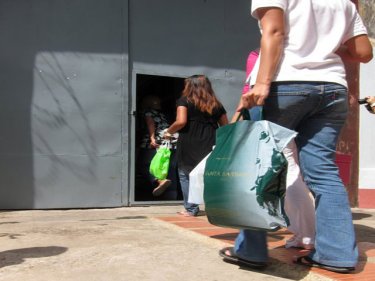PHUKET: Drug crimes have increased the population of Phuket Prison to bursting point - and the crowded conditions in the jail may hamper Thailand's battle for the extradition from Britain of murder suspect Lee Aldhouse.
Figures released today show that there were 1425 inmates in Phuket Prison as of yesterday, before 20 women were transferred to Songkhla Prison to make room for more.
Phuket Prison was built 109 years ago to deal with a population on Phuket that was about one tenth the size it is today, and long before drug-taking became such an issue.
More than 80 percent of Phuket inmates are being held for drug-related offences.
The prison's population is at least twice what it should be. Sources say that if officials sought to replicate the conditions in most Western prisons, Phuket Prison would be capable of holding about 300 inmates.
Suggestions of a second ''War on Drugs'' of the kind first waged under former Prime Minister Thaksin Shinawatra leave officials wondering where extra Phuket prisoners could be accommodated.
Although a site has been nominated, no budget has been set aside to build a new prison.
Conditions in Phuket Prison are inevitably growing worse. While Public Health authorities frequently check the health of prisoners, skin diseases are understood to be virtually impossible to avoid.
Phuket's prisoners sleep on floor mats so tightly packed into dormitory-style accommodation that some have compared conditions after lock-down to 18th century slave ships.
Requests by Phuketwan to tour the dormitory cells at Phuket Prison have been rejected.
However, former Phuket expat inmates have vividly described conditions on the inside that include intimidation and extortion, and disturbing sexual activity. No parts of the jail are private.
Conditions at Phuket Prison and in Thai jails generally are known to have been raised at the extradition hearing in London for Phuket murder suspect Lee Aldhouse.
The 28-year-old kickboxer is wanted on Phuket for the alleged murder of former US Marine Dashawn Longfellow in August 2010.
British Home Secretary Theresa May has been considering the extradition request since June 30. She has to deliver her decision before August 30.
With the first anniversary of the brutal Phuket knifing of Mr Longfellow now just two weeks away, Thai officials in Britain and Bangkok remain keen to have Mr Aldhouse returned to face a trial for murder.
While the case against Mr Aldhouse is believed to have been meticulously presented at Westminster Magistrates Court, conditions at Phuket Prison have already been raised as a cause for concern.
Mr Aldhouse, a former Birmingham bus driver and bouncer, is being represented by a Queen's Counsel who will be obliged to pursue the best interests of his client.
If the Home Secretary rules that Mr Aldhouse can be extradited, an appeal to Britain's High Court is likely to be mounted. If the Home Secretary rejected the extradition, Thai authorities would also be expected to appeal.
It's believed that senior officials in Thailand are so keen to have Mr Aldhouse extradited that if the conditions at Phuket Prison continue to be an issue, they would be prepared to have him accommodated in a Western-style two-person cell.
However, sources tell Phuketwan that Thailand's Office of Corrections is reluctant to provide special cells for anyone, especially considering there are not even remand centres for those people who remain innocent and are merely in jail awaiting trial.
The Aldhouse extradition proceedings will also be watched closely on both sides of the Atlantic.
One local police superintendent on Phuket noted that it seems almost unjust to have Thailand foot the bill for imprisoning an expat Briton for the murder of an expat American, simply because the killing took place on Thai soil.
Other, more senior officials in the Thai justice system don't view Thailand's responsibilities the same way. They want Mr Aldhouse in a Thai jail, if he is found guilty, to demonstrate that Phuket is an international destination and that no crime will be tolerated.
While capital punishment in Thailand remains a concern in Britain, where life in jail is now the ultimate penalty for murder, it's not considered a barrier to Mr Aldhouse's extradition.
And if Mr Aldhouse did happen to be sentenced to more than 18 years, he would be incarcerated in Bangkok rather than adding to the swollen population at Phuket Prison. All Thai prisons, though, are thought to be overcrowded at present.
One intriguing aspect of the case comes under the what-if category. American authorities have not had any involvement in official extradition proceedings so far.
But in the unlikely event that the British authorities eventually reject the extradition and allow Mr Aldhouse to walk free, could and would American officials mount a case for his extradition to the US and trial there for a crime allegedly committed on Phuket?
Pressure for action would certainly be applied strongly on US officials by Mr Longfellow's still-grieving family.
Crowded jail conditions on Phuket or not, to have Mr Longfellow's alleged killer escape trial and walk free would be an appalling outcome for international justice.





The treatment he would get in an American prison for the cowardly ambush murder of a US Marine would probably be worse than the sentence he would endure in Thailand, so Ms. May would be advised to extradite him to the Land of Smiles.
Posted by Atchariya P. Supaporn on July 26, 2011 14:12